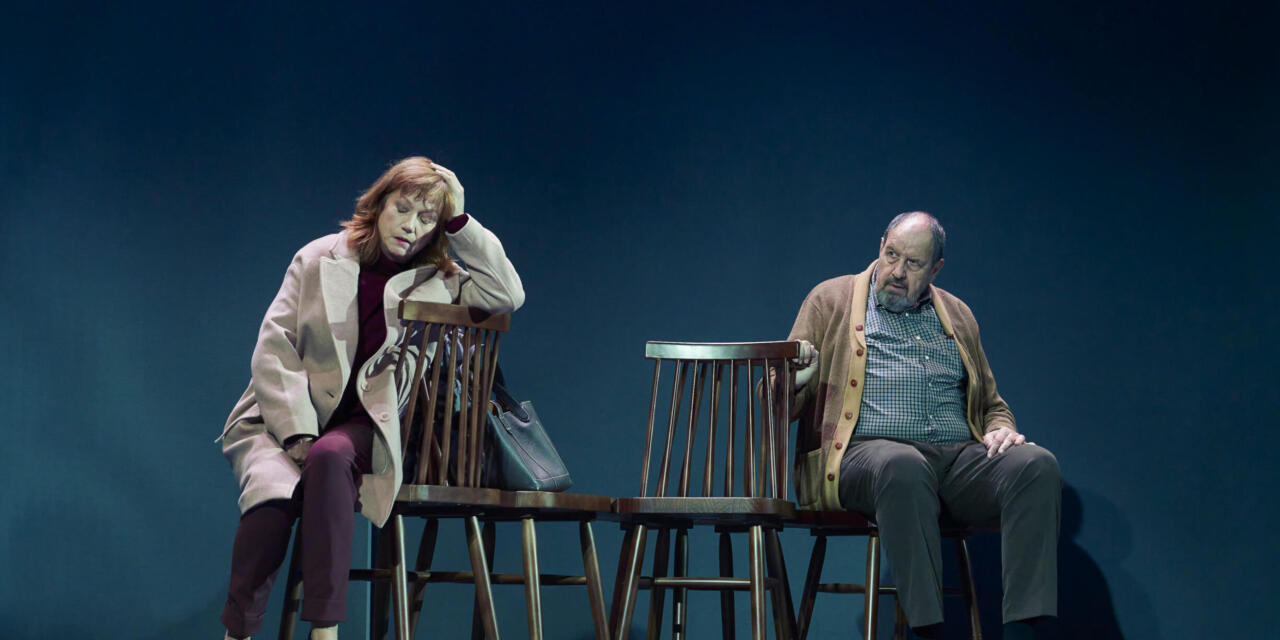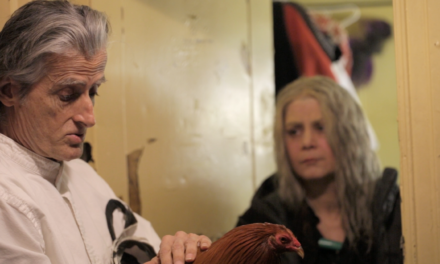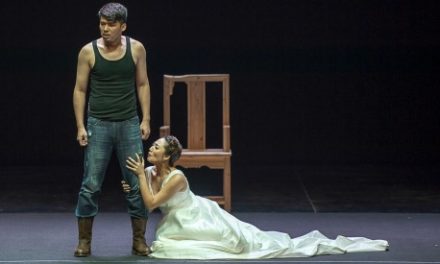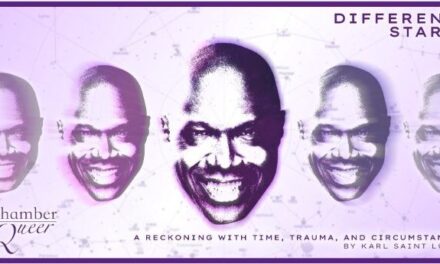Florian Zeller’s The Father, first produced in 2012, remains a timely play for various reasons. It provides a direct and confrontational examination of the challenges of living with dementia from a number of perspectives. On the surface, it allows an audience to witness the confusion experienced by the character with Alzheimer’s as persons are conflated, time appears to slip, situations are read in an alternative manner and different physical environments become almost interchangeable for the play’s protagonist. In a country like Spain where the pact of forgetting – introduced in the transition to democracy to put the Civil War and crimes of the dictatorship to one side in the hope of avoiding further civil confrontation — remains a very present part of recent history, the play’s focus on processes of forgetting gives the piece an additional and highly pertinent layer of meaning.
At Barcelona’s Romea Theatre, Josep Maria Mestres directs a new production of the play in Joan Sellent’s crisp, idiomatic Catalan-language translation. Paco Azorín’s set design provides no realistic apartment but rather an abstract, minimalist space with five wooden chairs each facing in a different direction. A fluorescent red frame gives the stage the shape of a rectangular box — the lighting in the room shifts colour as the production progresses, providing the sense of a shifting space, a fluid environment bereft of mimetic referents. It is almost an emotional landscape — a state of mind rather than a tangible place. The five chairs gradually become four, three, two, one and then none at the production’s end.
Any production of The Father stands by the performance of the actor in the titular role of Andrew. Anthony Hopkins, in an Oscar-winning performance, captured the patriarch’s erratic changes of mood with a lightness of touch. The character – renamed Anthony – was able to show remnants of what they might still remember from a past that is slipping away. Kenneth Cranham, in the first UK production, raged and ranted, resenting the dependency on his daughter Anne and her partner Peter. Chilean actor Héctor Noguera performed alongside daughter Amparo in the roles of Andrew and Anne in Marcelo Alonso’s production at Santiago’s UC Theatre in 2017 – a sense of familial complicity clearly on display. This Andrew — here renamed Andreu — is played by Josep Maria Pou. He first appears, book in hand, an educated, retired engineer: assured and seemingly in control. His voice dances with confidence as he tackles his daughter Anna’s questions. The colour coordinated costumes — shades of reassuring beige, olive green and rust – point to synergies and affiliations between father and daughter. There is, however, an increasingly gruff quality to his tone as disorientation sets in and the self-assured poise of Andreu’s encounters with Anna is replaced by increasing bemusement, as the persons around him assume new appearances. The audience experience the confusion that increasingly marks Andreu’s existence uncertain of whose truth – Anna’s or Andreu’s is to be believed.
This Andreu is not a character who inspires compassion. dismissive, seemingly self-sufficient, and smug, he smacks of privilege: a man used to getting his own way who doesn’t like to be confronted. Parallels with King Lear echo through the production. As the piece progresses, the stability of this privilege is eroded as Andreu questions who is who and cannot distinguish strangers from family members. He scratches his head perplexedly and looks at Rosa Renom’s increasingly tired Anna. He shadowboxes with his son in law Pere/Peter (Pep Pla) as a way of trying to impose his increasingly shaky status on the man he fears is taking his surviving daughter away from him. As the piece progresses, Pou’s demeanour becomes increasingly vulnerable, it is as if he visibly ages in front of the audience. It isn’t so much about shrinking or becoming a hunched figure but rather about a walk becoming more of a shuffle, about eyes darting with fear rather than the self-confident looks of the early scenes. He is perhaps a more imposing figure than Héctor Alterio in José María Plaza’s strongly realist 2016 production — Alterio felt more fragile and likeable from the start. Pou is less amiable, perhaps less obviously witty — although there are lovely moments of humorous complicity with Anna when flashes of the old Andreu emerge. Pou’s remarkable performance, however, makes the audience care for the predicament of this brusque man. Andreu is capable of being mean, as he demonstrates in his encounters with care worker Laura (Mireia Illamona), but as snippets of the past surface — most movingly references to a deceased daughter — a more complex picture emerges, one that invites the audience to judge less and empathise more.
There is something painful in watching the large, ambling Pou as Andreu at the end of the piece crying out for his mother — the moment reminded me of Pou’s Lear in 2004, fumbling in the storm for his Fool. His head darts unsettlingly; it is as if he no longer knows what to do with his hands. At the beginning of the production, he strode, at the end he stumbles like a toddler taking uncertain steps as they learn to walk. His eyes, once firm, now appear bemused, as if he is uncertain what to focus on. At the play’s end, he clutches the care home nurse (Victòria Pagès) like a frightened little boy. It is a performance of astonishing sensitivity from one of Spain’s greatest living actors.
Mestres —here reunited once more with Pou after their successful 2020 outing on Guillem Clua’s superb play Justícia at the Catalan National Theatre (TNC) — gives the production a snappy pace. The confusion that Andreu feels is one that the audience are made to navigate as it isn’t clear whose reality can be believed. A sliding door gives a sense of a world outside that Andreu is increasingly unable to negotiate. Ignasi Camprodon’s impressive lighting — the space moving across shades from green to lilac — reinforce this aura of instability, a space that is metaphorical perhaps more than material. It is almost as if characters are partly as Andreu remembered them – Pere/Peter almost always appears with a glass of red wine in hand. At the end the open space looks very much like a bleak hospital room. A medical bed for the vulnerable, frightened Andreu who is now in pale blue pyjamas — like a giant toddler — is the only item in the room: a reminder of where Andreu is and what the future holds.
Looking around the audience, I wondered how many of those around me were caring for parents, uncles, aunts, siblings, and/or grandparents with dementia. It may have been a tall order to follow Zeller’s impressive 2020 film version with Anthony Hopkins’ towering performance, but Mestres provides a very different reading of the play. His production feels abstract rather than realistic, but never theatrical. There is a clean quality to the staging that centres the audience’s gaze firmly on Andreu and his encounters. There is no disintegrating apartment here, no shifting props – just an old man falling apart in front of the audience.
The process of forgetting is a personal one but also a political one. I saw the production in the aftermath of Spain’s Democratic Memory Law that tries to engage very directly with issues of remembrance and commemoration of the Republican dead who had been sidelined in the pact of forgetting. Seeing this production alongside my reading of Sergi Pompermayer’s blistering new play Amèrica, playing at the Villaroel theatre in Julio Manrique’s much admired staging, I am struck by the abuses that might lie beyond the façade of respectability of a Catalan bourgeoisie that Andreu could also be seen to represent. There is nothing literal in Mestres’s production — rather what struck me was the local context in which an audience see the play which allows culturally specific readings to come into play. This is a very fine production of the play and in Josep Maria Pou it has an Andreu/Andrew that ranks among the very best I have seen.
El pare plays at the Romea theatre Barcelona until 26 February and then embarks on a tour across Catalonia.
This post was written by the author in their personal capacity.The opinions expressed in this article are the author’s own and do not reflect the view of The Theatre Times, their staff or collaborators.
This post was written by Maria Delgado.
The views expressed here belong to the author and do not necessarily reflect our views and opinions.


















